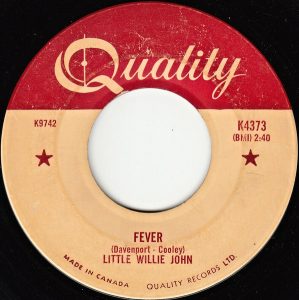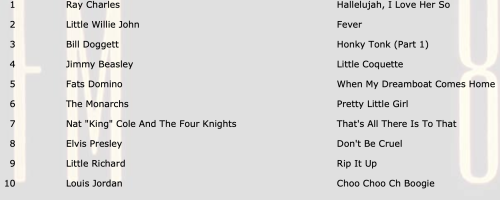#7: Fever by Little Willie John
City: Halifax, NS
Radio Station: CJCH
Peak Month: December 1956
Peak Position in Halifax ~ #2
Peak position in Vancouver ~ did not chart
Peak Position on Billboard Hot 100 ~ #27
Peak Position on Billboard R&B Best Sellers ~ #1
Peak Position on Billboard R&B Jockeys chart ~ #1
Peak Position on Billboard R&B Jukebox chart ~#1
YouTube: “Fever”
Lyrics: “Fever”
Little Willie John was born in 1937 in Cullendale, Arkansas. His family moved to Detroit in 1941 when his dad got work in a factory. He performed in a gospel singing group with a number of his siblings in the late 40s. In the early 50s he was singing with Paul “Hucklebuck” Williams Orchestra. In 1952 he had a seasonal regional hit in Detroit with “Mommy What Happened to Our Christmas Tree”. The song was credited to 14-year-old Willie John and Three Lads and a Lass. Willie John got the attention of a talent scout and was signed to King Records in 1955. He was nicknamed “Little Willie” due to his stature. His first hit with King Records was “All Around the World” which shot to #5 on the R&B charts in ’55. The song is a profession of the singer’s love for someone addressed as “my baby,” describing what else wouldn’t be true if he doesn’t love his woman. The refrain:
Well, if I don’t love you, baby
Grits ain’t groceries
Eggs ain’t poultry
And Mona Lisa was a man.
His followup single, “Need Your Love So Bad”, also climbed to #5 in early 1956 on the R&B charts. The B-side, “Home At Last”, peaked at #6. In May 1956, Little Willie John released “Fever”.

“Fever was credited to John Davenport, an alias for Otis Blackwell, and Eddie Cooley. Otis Blackwell was born in Brooklyn, New York, in 1931. In 1952, Blackwell won a talent contest at the Apollo Theatre in Harlem. This led to a recording contract with RCA, and subsequently with Jay-Dee Records. In May 1956, Blackwell wrote “Fever”, which became an R&B hit for Little Willie John. It turned into a Top 30 crossover pop hit in ’56, and was covered successfully by Peggy Lee in 1958. In July 1956, Otis Blackwell wrote “Don’t Be Cruel” for Elvis Presley which became a smash number-one hit. In 1957, Blackwell penned “Great Balls Of Fire” for Jerry Lee Lewis, and subsequently Lewis’ hit last Top Ten hit “Breathless”. He also co-wrote “All Shook Up” for Presley. In 1959, Blackwell wrote “Hey Little Girl” and “Just Keep It Up” for Dee Clark, a Top 20 hit. Then in 1960, Blackwell wrote “Handy Man” for Jimmy Jones which became a number-one hit. In 1962, Otis Blackwell wrote “Return To Sender” which became a number-one hit for Elvis Presley. He wrote another hit for Presley in 1963 titled “One Broken Heart For Sale”. Blackwell died in 2002 at the age of 70.
Eddie Cooley was born in Atlanta in 1933. He had a backing band called the Dimples. He wrote a song in 1956 titled “Pricilla” which climbed to #20 on the Billboard Pop chart. Eddie Cooley died at the age of 87 on his birthday in 2020.
“Fever” is a song that sizzles with sexual overtones. After all when this gal is around, the singer tells us she gives him ‘fever’ “in the morning, and fever all through the night.”
“Fever” peaked at #2 in Pittsburgh, and Nashville, #4 in Denver, and Portland (ME), #5 in St. Petersburg (FL), and Vero Beach (FL), #7 in Edmonton (AB), Kissimmee (FL), and Yakima (WA), #8 in Blytheville (AR), and #9 in Salem (MA), and Honolulu.
On the Billboard R&B Best Sellers chart, “Fever” topped the chart on July 21 and 28, and August 18, 1956. On the Billboard R&B Jockeys’ chart, “Fever” topped the chart for five consecutive weeks from July 21 to August 18/56. On the Cashbox Best Selling Singles chart, “Fever” peaked at #22 for three weeks in July ’56. While on the Billboard R&B Jukebox chart, “Fever” was #1 for the week of September 1, 1956. Interestingly, the single didn’t reach its peak in Halifax until October 1956.
“Fever” was successfully covered by Peggy Lee in 1958, climbing to #2 in Australia, #5 in the UK, and #8 in the Netherlands, and on the Billboard Hot 100 in the USA. Lee’s version was slowed down to become a torchy lounge tune. It became Peggy Lee’s most successful hit. In her version she introduced verses that began with 1) “Romeo loved Juliet, Juliet she felt the same,” and 2) “Captain Smith and Pocahantis had a very mad affair.” While these were new lyrics, due to Peggy Lee’s “Fever” being so popular, many people think these are the original lyrics.
In 1992, Madonna recorded a cover of “Fever”. Her version topped the pop charts in Finland, #5 in the Netherlands, #6 in Ireland and the UK, and #12 in Italy.
The B-side to “Fever”, titled “Letter To My Darling”, reached #10 on the Billboard R&B chart. While “Do Something for Me” made it to #15 later in ’56.
Little Willie John’s next six single released failed to chart on either the R&B or pop charts. However, in early 1958 “Talk To Me” reached #5 on the R&B chart, #20 on the Billboard Hot 100 and the Top 40 in Vancouver (BC). This was his sixth Top Ten R&B hit since 1955. “You’re A Sweetheart” and “Tell It Like It Is” both made the Top 15 later in ’58.
He made it back into the Top 15 in 1959 with “Leave My Kitten Alone” (#13) and “Let Them Talk” (#11). Meanwhile, on January 22, 1959, Jet Magazine ran this headline: “Little Willie John Charged in D.C. Grand Larceny.” It read “Blues singer William “Little Willie” John, 21, was arrested in Washington D.C. following an appearance at the Capital Arena, on charges of grand larceny. John, released on $1,000 bond and schedule to appear in court January 23, was charged with borrowing a ring valued at $2,000 from businessman Arthur Wilmer, 49, last June 30 and failing to return it. John, who admitted to borrowing the ring, said he lost it.”
In 1960 Little Willie John took “Heartbreak (It’s Hurtin’ Me)” to #11 on the R&B charts and #38 on the Hot 100, and “Sleep” to #10 and #13 on the Billboard Hot 100. “Sleep” also cracked the Top Ten in Toronto, Vancouver and Winnipeg (MB).
In 1961, “Take My Love” reached #5 on the R&B charts in the USA, while “Flamingo” was a Top 20 hit. In June 1961, Little Willie John was arrested on possession of marijuana while in Greensboro, North Carolina. His last charting single, “Now You Know” (#93 on the Billboard Hot 100) was in 1961.
John was involved in the civil rights efforts against segregation. He performed a benefit concert for the NAACP in 1964, telling Jet magazine: “As entertainers, we can no longer sit and wait for the Sammy Davis’ and Harry Belafonte’s to raise all of the money.”
John was also known for his short temper and propensity to abuse alcohol. After being arrested multiple times for various charges, Little Willie John was dropped by King Records in 1963. King Records kept re-issuing new recordings by Little Willie John of his earlier hits. This included “All Around the World” (1964 and 1970, “Let Them Talk” (1963), “Person to Person” (1963), “Do Something for Me” (1964), “Talk To Me, Talk To Me” (1965), and “Fever” (1962 and 1968).
In 1964, Little Willie John was arrested for assaulting a man in Miami with a broken bottle. In 1965, he was convicted of manslaughter for the November 1964 stabbing of Kendall Roundtree in Seattle.
A Jet Magazine headline on November 5, 1964, reported: “Little Willie John Stabs 240-Lb. Man to Death.” John’s manager, Clem Williams, told Jet that the stabbing was in self-defense. 240-lb. Roundtree had “slapped the little (135-pound) singer three or four times without provocation.” John was sent to prison in Walla Walla. John appealed the conviction and was released on probation while the case was reconsidered, during which time he recorded what was intended to be his comeback album. Due to contractual disputes and the decline of his appeal, it was not released until 2008 (as Nineteen Sixty Six). His sentence was eight years in prison. Little Willie John’s son, Kevin John, told LA Beat in 2012 that Little Willie John’s “legal representation was grossly ineffective. We believe that given the fact that…the man that died was…twice the size of my father, it should have been a case of self-defense. My father should never have been convicted of manslaughter… he was defending himself against a man who was a career criminal…”
John died at Washington State Penitentiary on May 26, 1968. Despite counterclaims, the cause of death stated on his death certificate was a heart attack. However, other sources variously said he was beaten to death and/or died of neglect after coming down with pneumonia. The telegram from the Washington State Penitentiary that Little Willie John’s mother received stated her son had died of pneumonia. A prosecuting attorney told author Susan Whitall that Little Willie John’s fate was likely “death by a prison guard.” And/or that Little Willie John got pneumonia as a consequence of being severely beaten in prison. At just 30-years of age, it was a tragic end to the life of a great singer to die in prison.
George Benson said of Little Willie John, “He was a great inspiration, a great influence. The way I approach singing today is largely influenced by Little Willie John.” Stevie Wonder recalls, “My mother told me, if you call yourself ‘Little’ Stevie Wonder, you’d better be as good as Little Willie John.”
In 1996, Little Willie John was posthumously inducted into the Rock n’ Roll Hall of Fame. In 2014 he was inducted into the Rhythm and Blues Hall of Fame. Little Willie John’s son, Keith, is a backing vocalist for Stevie Wonder.
April 15, 2024
Ray McGinnis
References:
“Little Willie John Charged in D.C. Grand Larceny,” Jet Magazine, January 22, 1959.
“Nab Little Willie John on Narcotics Charge,” Jet Magazine, June 22, 1961.
“Little Willie John Stabs 240-LB Man to Death,” Jet Magazine, November 5, 1964.
“R&B Singer ‘Little Willie’ John’s tragic end in Washington State,” KNKX, November 25, 2023.
Susan Whitall, Fever: Little Willie John, A Fast Life, Mysterious Death, and the Birth of Soul, (Titan Books, 2011).
Shirley Pena, “Fever: An Interview with Kevin John (son of Little Willie John),” LA Beat, August 8, 2012.
“Otis Blackwell, 70; Wrote Hits for Presley and Others,” New York Times, May 9, 2002.
Peggy Lee, “Fever“, Capitol Records, 1958.

CJCH 920-AM Halifax (NS) Top Ten | October 6, 1956

Leave a Reply